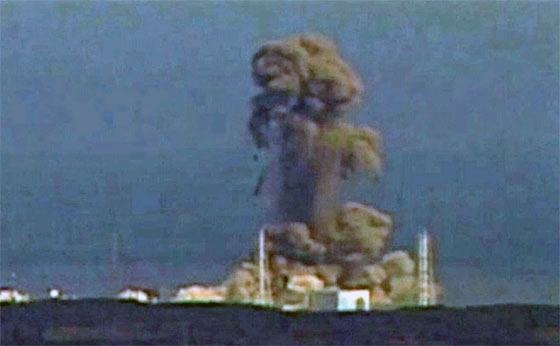Fukushima Nuclear Plant Unfolding Human Disaster
While the failed Fukushima Daiichi Japanese nuclear power plant continues to teeter with 1,300 spent fuel assemblies at the top of mangled reactor No 4, and the problems associated with radiation/cooling leaks and disposal of radioactive cooling water and materials, there is an unfolding crisis that is being largely ignored…
…the workers.
The departure of experienced workers, forced to leave after reaching their radiation exposure limit has largely left a growing number of inexperienced workers and contractors who themselves are dealing with issues of radiation exposure, moral problems, and accidents… all the while facing a 40-year cleanup plan.
Since the tsunami and subsequent meltdown during March 2011 and now, hundreds of employees have either reached the 100-millisievert [mSv] threshold or are near to it, meaning they have been removed, or their days at the plant are numbered.
Workers who have stayed on do so in the knowledge that they risk damaging their health through prolonged exposure to radiation and in accidents.
Tepco (the power company) has said that nearly 2,000 workers had estimated thyroid radiation doses in excess of 100 mSv, the level at which many physicians agree the risk of developing cancer begins to rise.
These risks are taking their toll on the dwindling number of workers with any real experience.
Some workers have left because of exhaustion and stress, while others have decided to find work closer to their displaced wives and children.
Many of the laborers employed by subcontractors live in cheap accommodation outside of the exclusion zone around the plant and they don’t communicate much with each-other while they look after number one.
“Newcomers are looked down on by their colleagues and some don’t really know how to do their jobs.” Another worker said he had seen hungover colleagues collapse with heatstroke just minutes after beginning work.
There are ongoing complaints from hotels and inn-keepers about drink-fueled fights. “These days, more seem to prefer the bars and commercial sex establishments.”
A contract worker, who asked not be named, and reported on by Justin McCurry of theguardian.com, said “Lots of men I know drink heavily in the evening and come to work with the shakes the next day. I know of several who worked with hangovers during the summer and collapsed with heatstroke.”
“Most of their employees have no experience of working in conditions like these, and all the time their exposure to radiation is increasing,” said Naka, who runs a firm just south of Fukushima Daiichi, that provides technical assistance to Tepco.
The unfolding disaster at the Fukushima Daiichi nuclear power plant has been largely unreported and ignored by the mainstream media and the world outside of Japan. While the expertise and moral of the remaining workers dwindle, as the oceans and fish around Japan are apparently aglow with radiation, and while the cores and thousands of nuclear fuel rods in and around the plant continue to present great risk to Japan and the world, we’re all too busy ignoring it rather than pushing Tepco and the government of Japan towards accepting International help to contain this disaster.
Fukushima has not gone away…

